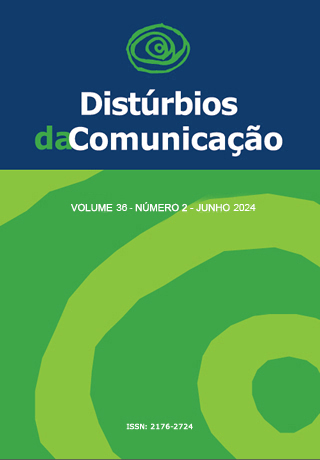Work-Related Voice Disorder (WRVD)
Achievements and Challenges in Latin America
DOI:
https://doi.org/10.23925/2176-2724.2024v36i2e66238Keywords:
Faculty, Voice Disorders, Surveillance of the Workers Health, Occupational Voice, Labor Legislation, Risk FactorsAbstract
Introduction: the Work-Related Voice Disorder Seminar: achievements and challenges in Latin America was held and the participants videos and slides were applied with the aim of understanding the achievements and challenges in recognizing work-related voice disorder (DVRT) ) in the guest countries (Argentina, Chile, Colombia, Peru, Venezuela and Brazil). Description: categories of analysis were identified, considering, in addition to the challenges and achievements, the existing legislation in each of the countries represented at the event. All countries identified the teacher’s voice as representative of occupational diseases, also considering similarities in the environment and organization of the context of teaching work when comparing Brazil with other Latin American countries. The legislation, in most of them, is still ineffective. The speech therapist is the essential professional for planning and executing actions. Assistance to workers with DVRT in different countries is the responsibility of public or private institutions, mostly linked to the Ministry of Health. Final considerations: the similarities and differences found show the need for greater exchange of experiences between Latin American countries, with the aim of promoting the creation of a permanent forum for discussion and planning of multicenter research. Other countries should be invited to join this movement.
Downloads
References
Masson MLV, Ferrite S, Pereira LMA, Ferreira LP, Araujo TM. (2019). Em Busca do Reconhecimento do Distúrbio de Voz como Doença Relacionada ao Trabalho: Movimento histórico-político. Ciênc. saúde coletiva. 2019; 24(3): 805-16.
Brasil. Ministério da Saúde. Secretaria de Vigilância em Saúde. Departamento de Vigilância em Saúde Ambiental e Saúde do Trabalhador. Distúrbio de Voz Relacionado ao Trabalho – DVRT, 2018; 42 p. https://bvsms.saude.gov.br/bvs/publicacoes/disturbio_voz_relacionado_trabalho_dvrt.pdf
Ferreira LP, Andrada e Silva MA de. Work-Related Voice Disorder: Achievements and Challenges in Latin America. Sintropia. São Paulo. 2022. 402p. https://www.pucsp.br/laborvox/dicas_pesquisa/downloads/ebooks/Disturbio-de-Voz-Relacionado-ao-Trabalho-Conquistas-e-Desafios-na-America-Latina.pdf
Osorio JLD, Figueroa KD. Síndrome de Burnout y sintomatología depresiva en profesores: relación entre tipo de docencia y género en establecimientos educacionales subvencionados de Santiago de Chile. REICE: Revista Iberoamericana sobre Calidad, Eficacia y Cambio en Educación, 2012; 10 (3), 72-87
Mello MCMB, Cantor-Cutiva LC, Ferreira LP. Overview of three Latin American countries in voice problems related to working conditions. CoDAS. 2021 30(5):e20200304 DOI: 10.1590/2317-1782/20202020304
Vilela FCA, Ferreira LP. Voz na clínica fonoaudiológica: grupo terapêutico como possibilidade. Distúrb Comun, 2006; 18(2), 235-43
Cantor-Cutiva LC, Dalmasso MC, Mello MCMB de. Association between voice symptoms and college professors’ home working conditions during online classes in times of COVID-19 pandemic. Revista de Investigación e Innovación en Ciencias de la Salud. 2022, 4(1). https://doi.org/10.46634/riics.124
Downloads
Published
Issue
Section
License
Copyright (c) 2024 Léslie Piccolotto Ferreira, Maria Celina Malebran Bezerra de Mello, Flavia Nogueira Ferreira de Souza, Lady Catherine Cantor Cutiva, Maria de Fátima Pires Dantas Cavalcanti, María del Carmen Dalmasso, Maria Lucia Vaz Masson, Maria Maeno, Ramón Hernández-Villoria, Marta Assumpção de Andrada e Silva

This work is licensed under a Creative Commons Attribution 4.0 International License.









